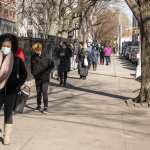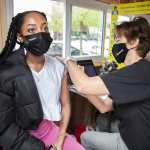A top federal committee voted unanimously in favor of granting emergency authorization to the Johnson & Johnson COVID-19 vaccine on Friday for use in people age 18 and older. That non-binding recommendation means that the one-shot immunization could receive authorization from the Food & Drug Administration in a matter of days, which could have a significant impact on vaccine access for marginalized people.
Pending emergency authorization, the White House has said it has 3 to 4 million doses of Johnson & Johnson vaccines ready to send states within the next week. Currently, states are administering a rolling average of about 1.7 million coronavirus vaccines a day from Moderna and Pfizer’s two-shot regimens. The United States has secured enough vaccines from Moderna and Pfizer to vaccinate the entire country by the end of July.
A third vaccine could speed things up. In a congressional hearing this week, a Johnson & Johnson executive testified that, upon receiving authorization, the company would deliver 20 million doses of vaccine by the end of March and would be on track to provide 100 million doses of the vaccine by the end of June — enough to vaccinate almost a third of the U.S. population. If people are immunized faster, newer and more contagious variants are less likely to emerge.
Data analyzed by the FDA suggests the vaccine is highly effective in preventing severe illness from COVID-19 and hospitalization. Those findings held true in both the United States and South Africa, where the more potent B.1351 variant has emerged. But the agency found that there wasn’t enough evidence to weigh in on whether the immunization protected adults older than 75, a particularly vulnerable group.
The Johnson & Johnson vaccine is also simpler to produce than the currently authorized vaccines. And because it requires only one dose, experts say it might be easier to give to people who don’t have consistent access to the health care system.
Still, it’s not yet fully clear how long any vaccine-induced immunity will last, especially as new variants of the coronavirus continue to emerge. That means there are open questions about whether people who receive a coronavirus vaccine might require subsequent booster shots.
Johnson & Johnson’s immunization is based on what’s called a “viral vector” — using an adenovirus that has been designed to trick the body into thinking it’s been infected by COVID-19, so that the body generates antibodies to fight off any infection. But that technology means it could be harder to develop those boosters, especially if people end up requiring annual coronavirus shots. The concern is that people could develop immunity to the vaccine itself.
In that regard, if people end up needing annual coronavirus booster shots, the vaccines developed by Moderna and Pfizer — which use a different mechanism to create coronavirus antibodies — could have an advantage.
The national vaccination campaign has so far struggled with equity and access issues. In particular, available data shows that Black and Latinx people are far less likely to have received vaccine doses, even though they are more likely to have been exposed to and infected by the coronavirus.
One issue, experts agree, is that demand for the vaccine far outstrips supply, and the online sign-up systems in many states privilege people who have more flexible work hours, stable internet and children or other relatives who can help them sign up.
The barriers are especially acute for undocumented women, for those with caregiving responsibilities and for frontline workers. They are more likely to be saddled not only with inflexible work hours, but also to be navigating responsibilities such as child care.
But an influx in supply could help alleviate equity concerns, by making it easier to vaccinate people who don’t have time to go back for multiple appointments.
“This will get more people vaccinated,” Rupali Limaye, an associate scientist at Johns Hopkins University, previously told The 19th.
Still, supply is only one issue. Experts say addressing vaccine equity will require a variety of strategies such as making vaccines available through community health clinics, which predominantly serve lower-income people, and providing them at times of the day that could accommodate women who are working multiple jobs. It also means partnering with organizations such as churches, schools and community health centers to help alleviate people’s concerns about vaccine safety.
“It is going to be important to continue focusing on equity — and ensuring racial equity is really going to hinge on having deliberate, intentional efforts,” Samantha Artiga, director of racial equity and health policy at the nonpartisan Kaiser Family Foundation, told The 19th.
So far, more than 509,000 Americans have died of COVID-19, according to data compiled by Johns Hopkins University.
And though the rate of new cases had been decreasing since mid-January, the Centers for Disease Control and Prevention warned Friday that the trend may be reversing. The past three days have all recorded more than 70,000 cases per day — an increase from numbers recorded the prior week.
“We may be done with the virus, but clearly the virus is not done with us,” CDC Director Rochelle Walensky told reporters Friday.





